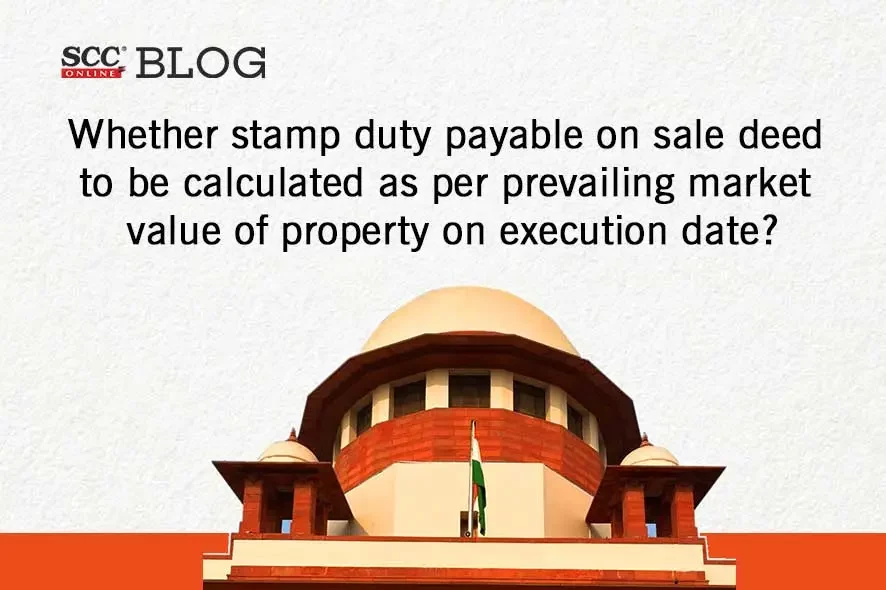Supreme Court: In the issue relating to determination of the market value of a property at Allahabad, registered in 2010 for the purpose of stamp duty, the Division Bench of Abhay S. Oka* and Rajesh Bindal, JJ., allowed the appeal and set aside the impugned judgment of the High Court of Allahabad and Assistant Stamp Collector (Collector) and has remanded the case for fresh consideration to the Collector.
Factual Matrix
One Shanti Bhushan (appellant) claimed to be protected tenants under the United Provinces (Temporary) Control of Rent and Eviction Act, 1947 and subsequently under the U.P. Urban Buildings (Regulation of Letting, Rent and Eviction) Act 1972. It was the case of the appellant that the owner of the property agreed to sell the property to appellants father for Rs. 1 lakh in September 1966.
An adjudication was made by the Collector on behalf of the appellant. After inspection of the sale deed property, the Collector came to the conclusion that the description of the property in the sale deed was incorrect. The Collector observed that in the sale deed, the covered area of the land is shown as 970 meters, but actually, it was found to be 995 sq. meters. The Collector referred to four sale transactions of the year 2010 which were in relation to the properties which were a part of the same larger property wherein the market value shown was Rs. 24,000/per sq. meter. The determination of market value by taking the market value at Rs. 24,000/per sq. meters has been approved by the Collector, Appellate Authority and the High Court.
It was the case of appellants that in 2012, they have paid a stamp duty of Rs. 70 lakh already. Subsequently they deposited an additional amount of Rs. 30 lakh. The High Court of Allahabad affirmed the market value fixed by the authorities, and granted limited relief to the appellants by setting aside the demand of the penalty of Rs. 27,00,000/.
The appellants contended that when property is in possession of a tenant, the market value considerably diminishes, as the market value reduces if there are encumbrances on the property. It was further contended that market value of a property is ascertained by applying the test of what a willing buyer would pay .
On the contrary the State argued that determination of rateable value for the purposes of determination of property taxes is always made on the basis of hypothetical rent which the property may fetch.
Decision and Analysis
Issue: Whether stamp duty payable is to be calculated as per the prevailing market value of the sale deed land on the date of execution.
The Court agreeing with the State, opined that the stamp duty on a conveyance will be payable as per the market value prevailing on the date of conveyance according to Article 23 of Schedule IB of the Act applicable in the State of Uttar Pradesh. It was also opined that the stamp duty is payable on the basis of such market value and not on the consideration mentioned in the document.
It was noted that market value mentioned in the agreement for sale or the market value prevailing on the date of the agreement or the market value prevailing on the date on which the bargain was struck is of no relevance for deciding the stamp duty.
Hence, the appellant were under an obligation to pay stamp duty calculated on market value by the authorities.
The Court held that market value is the one which a bona fide and willing buyer will offer. It was further noted that there was no doubt that a property in possession of a tenant will fetch lesser value in the open market than the market value of a similar property exclusively in possession of the vendor. The reason is that the buyer will not get actual possession of the portion of the property in possession of the tenant.
It was concluded that the issue regarding the market value of the sale deed land on the date of execution of the sale deed is required to be decided by permitting the parties to adduce oral and documentary evidence. Collector will have to ascertain whether a comparable sale instance of a property in possession of tenants is available. Thereafter, he will have to determine the percentage of the deduction which should be made from the market value in the facts of this case. These questions are to be decided by the Collector on the basis of the evidence on record.
Appeal allowed; Assistant Stamp Collector directed to permit the appellants to lead evidence on the issue of valuation.
[Shanti Bhushan v. State of UP, 2023 SCC OnLine SC 489, decided on 25-04-2023]
Judgment authored by: Justice Abhay S. Oka
Advocates who appeared in this case :
For the Appellant: Jayant Bhushan, Senior Advocate;
For the Respondent: R.K. Raizada, Senior Advocate.







